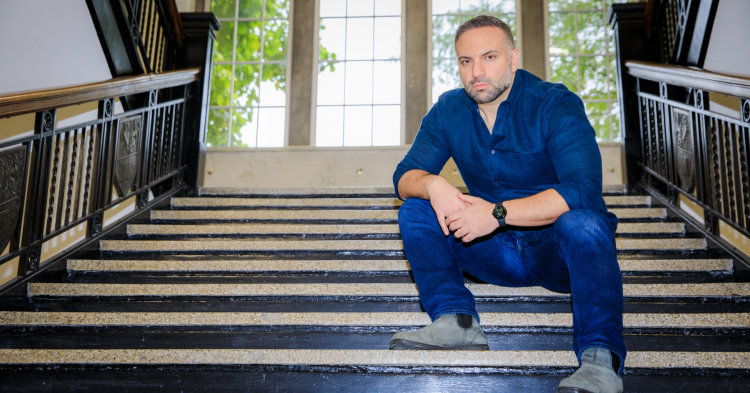
Author Saeed Teebi said it's a "gift" to be able to help build connections between writers. He believes building community is crucial for those in a solitary pursuit like writing. (Christopher Kindratsky/Western Communications)
Western's newest writer-in-residence sees writing as a shared endeavour.
Saeed Teebi hopes to connect with as many aspiring writers as he can to share expertise and advice during his residency. He's excited to "talk shop."
"Writing, for most people, is something they love, something they do out of a sense of passion - as I do. The opportunity to talk shop' with people is a fun way to spend time," he said.
"I hope to have as wide an impact as I can. I'm here for everybody."
The writer-in-residence program provides support for the writer to practice their craft and allows the university community to benefit from their creativity and expertise. The residency, run in partnership with the London Public Library, includes office hours for amateur creative writers at Western and across London, Ont. to seek feedback.
Teebi said he's looking forward to all kinds of conversations about the craft, whether that's the mechanics of writing, getting published or general career advice.
"That idea of affirming writers is important to me, because it's very easy to be herded away from writing." - Saeed Teebi, author and Western's newest writer-in-residence
And Teebi knows a thing or two about writing.
His debut collection of short stories, Her First Palestinian, was a finalist for numerous awards, including the Atwood Gibson Writers' Trust Fiction Prize - the jury calling it "exquisitely written" - the Rakuten Kobo Emerging Writer Award and the Danuta Gleed Literary Award.
"He does not preach, yet his writing expresses a certain fervour that is essential. He is a vital voice," the jury for the Atwood Gibson Writers' Trust Fiction Prize wrote.
Teebi's next book will be a work of personal non-fiction titled You Will Not Kill Our Imagination. He is also working on a novel about three young people as they navigate life in Canada and the U.S. after 9/11.
From law to creative writing
Teebi has always considered himself a fiction writer, but started with short stories because he wanted a project he knew he could finish while working as a lawyer.
In addition to his own writing and his new role at Western, Teebi works with a technology company as in-house legal counsel.
He said law and creative writing have more in common than people may think.
"It might seem that they're unrelated, but at its core, law is about reading, writing and ultimately creating a narrative. For me, it's not so different."
Legal writing has also helped make his creative work more succinct and less flowery, Teebi said.
Western's writer-in-residence program is one of the oldest in the country. Each year since 1972, the Faculty of Arts and Humanities has hosted a writer. The program has featured playwrights, poets, essayists, novelists and a broad range of literary voices.
In 2022, in honour of the 50th anniversary of the writer-in-residence program, Western Libraries curated a digital collection with over 1,200 titles from more than 50 authors who have been part of the program.
Last year's writer-in-residence was writer and poet Tea Mutonji, whose first published work was also a collection of short stories, called Shut Up You're Pretty.
The program gave rise to the companion student writer-in-residence at Western, created in partnership with the University Students' Council, which gives an undergraduate student the opportunity to take on a creative leadership position and provides a platform for their work. This year's student writer-in-residence is Jules Lee.
In addition to their own development and the mentorship of emerging writers, the writer-in-residence also contributes to the wider creative community.
Teebi is eager to hold events, readings and do classroom visits during his tenure. Connecting with other writers helps to build enthusiasm, inspiration and ideas, he said.
"It's always good, when you have a solitary pursuit like writing, but you feel in community with other writers. For me, it's a gift to be able to do that," Teebi said.
"We don't all have the same experiences, backgrounds, preoccupations, but I'm here to help with yours. Writing is a shared endeavour that we all have, that's what I place above all else in this role."













